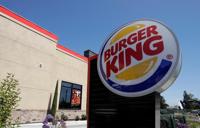Tim Hortons' parent company recorded higher sales and profit in its most recent quarter despite "macroeconomic pressures" weighing on the restaurant industry.
Restaurant Brands International Inc. said Thursday its consolidated same-store sales grew 9.1 per cent, pushing its third-quarter revenue to nearly US$1.73 billion from $1.50 billion in the same quarter of 2021, while profit hit US$530 million up from US$329 million.
The strong earnings come even as the company's franchisees — brands including Burger King, Popeyes Louisiana Kitchen and Firehouse Subs — face a challenging economic environment.
"We're all fully aware of the continued macroeconomic pressures impacting our industry and our franchisees," said José Cil, CEO of Restaurant Brands, during a call with analysts. "These include ongoing commodity and wage inflation and rising interest rates."
Still, the company's restaurants offer "value for money" and continue to perform well despite pressures, he said.
In Canada, Tim Hortons' comparable sales increased 11.1 per cent in the three months ended Sept. 30, compared with the same period last year.
The coffee and doughnut chain's cold beverage sales grew by 14 per cent compared with 2019, Cil said.
Cold beverages now make up more than 40 per cent of Tim Hortons' total beverage sales, up from 34 per cent in the third quarter of 2019, he said.
Excluding the Iced Capp — a popular menu item for several years — the restaurant's cold beverage sales grew nearly 80 per cent amid strength in its cold brew coffee and Quenchers cold fruit beverages, Cil said.
Tim Hortons also recorded growth in its afternoon and evening food sales on the success of its so-called Loaded platform, including Loaded Bowls.
"We saw a roughly two per cent contribution to our year-over-year same-store sales increase of 11 per cent coming from the Loaded platform," Cil said.
Traffic continued to bounce back from pandemic lows at the coffee and doughnut chain.
Sales at downtown locations were about five per cent below 2019 levels in the most recent quarter — an improvement compared with a roughly 40 per cent drop during the pandemic.
Yet the company is starting to move past comparing traffic with pre-pandemic levels.
"We're beginning to pay far less attention to mobility numbers," Restaurant Brands chief corporate officer Duncan Fulton said in an interview.
"It's about to be in 2023 and the reality is we all have new routines," he said. "Maybe you're going to the office three days a week or maybe you're working from home. We simply need to be there for people."
Cil added: "Mobility remains a challenge and we're not waiting for mobility to come back. It's not the crux of our plan."
Meanwhile, the shortage of labour in the restaurant industry continues to impact Restaurant Brands franchisees.
The best thing Ottawa could do to help the restaurant and retail sectors would be to provide more flexibility for companies to access foreign labour to fill vacant positions, Fulton said.
"It's critical," he said. "We need more people."
Hiring foreign workers is currently "very bureaucratic and time intensive," Fulton said, adding that on average it takes almost a year to bring a worker to Canada.
Critics have suggested the restaurant and retail sectors could find the workers they're seeking if they offered higher wages.
But Fulton said even with higher wages, labour shortages continue to plague the industry.
"Everyone is paying well above minimum wage in most cases and you're competing for labour between retailers and restaurants and Amazon distribution centres and a number of industries," he said.
"When you're all offering a competitive wage and there's just not enough people available to work, then you need to look outside of your community."
On an adjusted basis, Restaurant Brands said it earned 96 cents per diluted share, up from an adjusted profit of 76 cents per diluted share a year ago.
Analysts on average had expected a profit of 80 cents per share and US$1.66 billion in revenue, according to estimates compiled by financial markets data firm Refinitiv.
This report by Ďă¸ŰÁůşĎ˛ĘąŇĹĆ×ĘÁĎ was first published Nov. 3, 2022.
Companies in this story: (TSX:QSR)










































